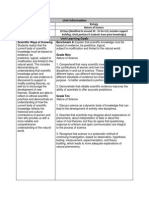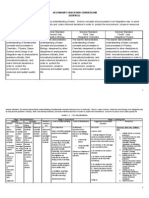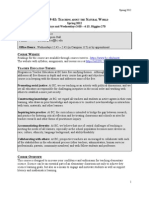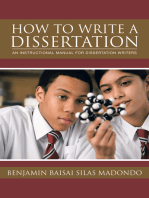Unit-1-Learning-output-Teaching-Science
Uploaded by
Mae Cherry PacioUnit-1-Learning-output-Teaching-Science
Uploaded by
Mae Cherry PacioUnit 1 LEARNING OUTPUT: Insight Paper on the Domains of Science
Title: Exploring the Domains of Science: Knowledge, Processes, and
Values
Rubric for Insight Paper on the Domains of Science
Needs
Criteria Excellent (4) Good (3) Fair (2)
Improvement (1)
Provides a
Provides limited Provides minimal or
comprehensive Provides adequate
background and no background and
background and background and
Introduction somewhat states does not clearly
clearly states the states the objective
the objective of the state the objective
objective of the of the paper.
paper. of the paper.
paper.
Thoroughly discusses Discusses the Somewhat
Minimally discusses
Understanding the application of application of discusses the
the application of
and Applying scientific principles scientific principles application of
scientific principles
Scientific in both local and in both local and scientific principles,
and lacks detail and
Knowledge global contexts, with global contexts, with but lacks detail or
examples.
detailed examples. some examples. examples.
Clearly explains
Explains hypothesis
hypothesis
Performing formulation, Somewhat explains Minimally explains
formulation,
Scientific experimentation, scientific processes, scientific processes
experimentation,
Processes and data collection, and but lacks detail or and lacks detail and
data collection, and
Skills analysis with some examples. examples.
analysis with
examples.
detailed examples.
Thoroughly discusses
Developing and Discusses the Somewhat Minimally discusses
the importance of
Demonstrating importance of discusses scientific scientific attitudes
curiosity, skepticism,
Scientific scientific attitudes attitudes and and values and
open-mindedness,
Attitudes and and values with values, but lacks lacks detail and
and ethics with
Values some examples. detail or examples. examples.
detailed examples.
Provides a
comprehensive Provides an Provides a limited Provides a minimal
Literature review of relevant adequate review of review of literature or no review of
Review literature with relevant literature with minimal literature and lacks
detailed analysis and with some analysis. analysis. analysis.
synthesis.
Formulates insightful
Formulates relevant Formulates some Formulates minimal
and thought-
Guide guide questions that guide questions that or no guide
provoking guide
Questions align with the somewhat align questions that align
questions that align
content. with the content. with the content.
with the content.
Provides an Provides a limited Provides a minimal
Provides a thorough
adequate summary, summary, minimally or no summary,
summary, discusses
discusses discusses does not discuss
Conclusion implications, and
implications, and implications, and implications, and
makes well-founded
makes some makes few makes no
recommendations.
recommendations. recommendations. recommendations.
Writing is clear, Writing is clear with Writing lacks clarity Writing is unclear
Writing Quality concise, and free of minimal and has some and has numerous
grammatical errors. grammatical errors. grammatical errors. grammatical errors.
References to be included
An Insight Paper on the Domains of Science
Exploring the Domains of Science: Knowledge, Processes, and
Values
I. Introduction
Background: Provide an overview of the importance of understanding
the domains of science. Highlight the relevance of scientific knowledge,
processes, and values in both local and global contexts.
Objective: State the purpose of the insight paper, which is to explore the
domains of science and their significance in education and real-world
applications.
II. Understanding and Applying Scientific Knowledge
Local Context: Discuss how scientific principles can be applied to
address specific environmental, health, or technological issues within the
community. Provide examples of local projects or initiatives that utilize
scientific knowledge.
Global Context: Cite studies that mention where scientific knowledge
has been used to solve global challenges, such as climate change,
pandemics, or sustainable development. Emphasize the importance of
international scientific collaboration.
III. Performing Scientific Processes and Skills
Formulating Hypotheses: Explain the steps involved in developing
testable hypotheses based on observations. Discuss the importance of
asking relevant questions and making informed predictions.
Experimentation and Data Collection: Describe the process of
designing and conducting controlled experiments. Highlight the tools and
techniques used for accurate data collection and recording.
Data Analysis and Interpretation: Discuss methods for analyzing and
interpreting data. Emphasize the importance of drawing logical
conclusions and considering possible sources of error.
Communication: Highlight the significance of effectively sharing
scientific findings through reports, presentations, and discussions.
IV. Developing and Demonstrating Scientific Attitudes and Values
Curiosity: Discuss the role of curiosity in driving scientific discovery and
investigation. Provide examples of how curiosity can lead to
breakthroughs in science.
Skepticism: Explain the importance of skepticism in evaluating
information and sources of evidence. Discuss how skepticism contributes
to the rigor and reliability of scientific research.
Open-mindedness: Highlight the value of being open-minded when
considering different perspectives and ideas in scientific discussions.
Provide examples of how open-mindedness can lead to innovative
solutions.
Ethics: Discuss the ethical standards that scientists must uphold in their
research and experiments. Emphasize the importance of honesty,
integrity, and responsibility in scientific practice.
V. Conclusion
Summary: Summarize the key points discussed in the paper, reinforcing
the importance of understanding and applying scientific knowledge,
performing scientific processes, and developing scientific attitudes and
values.
Implications: Reflect on the broader implications of these domains for
education and real-world applications. Discuss how a comprehensive
understanding of science can prepare students for future roles as
educators, researchers, and informed citizens.
You might also like
- A Practical Guide to Qualitative Research: A Guide for Research Students, Supervisors, and Academic AuthorsFrom EverandA Practical Guide to Qualitative Research: A Guide for Research Students, Supervisors, and Academic AuthorsNo ratings yet
- Research Iv Quarter 1 Week 1& 2: Not For SaleNo ratings yetResearch Iv Quarter 1 Week 1& 2: Not For Sale7 pages
- Green Illustrated Science Project Presentation 20250122 072148 0000 CopyNo ratings yetGreen Illustrated Science Project Presentation 20250122 072148 0000 Copy49 pages
- Junior High School Department Weekly Lesson Log: The College of MaasinNo ratings yetJunior High School Department Weekly Lesson Log: The College of Maasin4 pages
- PR1 - Lesson 1 Nature and Importance of ResearchNo ratings yetPR1 - Lesson 1 Nature and Importance of Research28 pages
- The Nature of Science, Goal, Scope, Key Area Standards and Principles Objectives: at The3 End of The Lesson, Students Are Expected ToNo ratings yetThe Nature of Science, Goal, Scope, Key Area Standards and Principles Objectives: at The3 End of The Lesson, Students Are Expected To6 pages
- Science Curriculum Framework For Basic EducationNo ratings yetScience Curriculum Framework For Basic Education41 pages
- Science Fair Rubric & Reflection questions 2023No ratings yetScience Fair Rubric & Reflection questions 20234 pages
- Human Growth and Development by SlidesgoNo ratings yetHuman Growth and Development by Slidesgo40 pages
- PISA 2018 - Scientific Competencies FrameworkNo ratings yetPISA 2018 - Scientific Competencies Framework4 pages
- 2010 SEC - Science Curriculum Guide PDFNo ratings yet2010 SEC - Science Curriculum Guide PDF41 pages
- Introduction To Science and Scientific MethodNo ratings yetIntroduction To Science and Scientific Method6 pages
- Human Anatomy and Physiology - 10th Grade by SlidesgoNo ratings yetHuman Anatomy and Physiology - 10th Grade by Slidesgo40 pages
- How To Write An Introduction For Science Coursework100% (1)How To Write An Introduction For Science Coursework7 pages
- How to Write a Dissertation: An Instructional Manual for Dissertation Writers.From EverandHow to Write a Dissertation: An Instructional Manual for Dissertation Writers.No ratings yet
- PracRsearch2 Gr12 Q1 Mod1 Nature of Inquiry and Research Ver3No ratings yetPracRsearch2 Gr12 Q1 Mod1 Nature of Inquiry and Research Ver339 pages
- Computing and Network Sustainability Proceedings of IRSCNS 2018 Sheng-Lung Peng 2024 Scribd Download100% (1)Computing and Network Sustainability Proceedings of IRSCNS 2018 Sheng-Lung Peng 2024 Scribd Download65 pages
- Instant download Loose Leaf for Methods in Behavioral Research 14th Edition Paul C. Cozby pdf all chapter100% (3)Instant download Loose Leaf for Methods in Behavioral Research 14th Edition Paul C. Cozby pdf all chapter66 pages
- NCCEDU L3DC Qualification Unit Specification V2.3 For SPRING 2020 Assessment OnwardsNo ratings yetNCCEDU L3DC Qualification Unit Specification V2.3 For SPRING 2020 Assessment Onwards33 pages
- Effects of Call of Duty to the Academic Performance of Junior High School StNo ratings yetEffects of Call of Duty to the Academic Performance of Junior High School St6 pages
- Quality Management in Education: Suzana Vlašić, Smiljana Vale, Danijela Križman PuharNo ratings yetQuality Management in Education: Suzana Vlašić, Smiljana Vale, Danijela Križman Puhar9 pages
- IAPSM's Textbook of Community Medicine: Book ReviewNo ratings yetIAPSM's Textbook of Community Medicine: Book Review1 page
- A Study On Street Food in Developing Countries: Submission of Synopsis or Project Report OnNo ratings yetA Study On Street Food in Developing Countries: Submission of Synopsis or Project Report On4 pages
- Guide To Reviewing Published Evidence For Use in HIA - LHO England - 2006No ratings yetGuide To Reviewing Published Evidence For Use in HIA - LHO England - 200612 pages
- Fazal Rizvi and Bob Lingard - Globalizing Education Policy-Routledge (2009)No ratings yetFazal Rizvi and Bob Lingard - Globalizing Education Policy-Routledge (2009)241 pages
- Benchmarking Process For Product Development: A Project Reports ONNo ratings yetBenchmarking Process For Product Development: A Project Reports ON43 pages
- Questions To Ask When Doing A Literature Review100% (2)Questions To Ask When Doing A Literature Review4 pages
- An Empirical Investigation of Culture Impact On Consumer Perception and Attitude Towards AdvertisingNo ratings yetAn Empirical Investigation of Culture Impact On Consumer Perception and Attitude Towards Advertising312 pages
- Communication in Cognitive Behavioral Therapy PDF100% (3)Communication in Cognitive Behavioral Therapy PDF286 pages

























































































